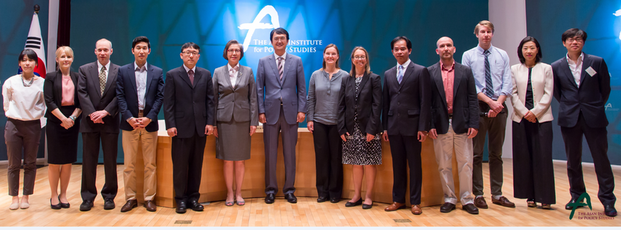 Image: The Asan Institue for Policy Studies |
While the road to a North Korea in transition is rife with stumbling blocks, as many if not more lie at the end, at which point the transitional justice process for the North will have only just begun.
In order to prepare for the myriad
scenarios and prepare to navigate the undoubtedly murky waters of the Korean Peninsula’s future, a small but growing contingent of voices is looking to raise the constructive discourse surrounding this issue.
At a recent conference hosted by The
Transitional Justice Working Group (TJWG), Human Asia, The Asan Institute for
Policy Studies, and SSK (Social Science Korea) Human Rights Forum, experts
brought forth the clashing opinions necessary to look at and unpack this complex problem from various vantage points.
“After the Korean Peninsula attained
independence from Japan in 1945, South Korean society missed the opportunity to
hold accountable those who were responsible for or profited from the abuses in
the colonial period. This explains why the guilt-by-association culture, which
originated from the mismanagement of restorative justice, became embedded in
this society even today,” said Hubert Younghwan Lee, the chief director of
TJWG, explaining the need to hold the North Korean authorities
responsible for their human rights violations with consideration to the indispensable preparations involved therein.
Dr. Kyunam Kim, a researcher at Institute
of International Relations, University of Warsaw, elaborated on this point, noting the very realistic possibility of reduced sentences for North Korean perpetrators
in exchange for cooperation and collaboration throughout the transition.
“For instance, if the North Korean
authorities actively negotiate with the South Korean government in bringing
about reunification, they might receive commutations. This would be undoubtedly distressing for the victims, but commutation is nonetheless
a very plausible scenario,” he said.
Engaging and bringing in the international
community in such a scenario would be another critical factor worth bearing in mind, according to
Dr. Sara Son, TJWG’s research director, who pointed out that both Koreas have a tendency to “resist outside or external
input, collaboration, or involvement” due to a history of “colonial occupation and a
division (of the peninsula) at the hands of external powers.”
“A healthy balance of the right kind of
external support and involvement should be incorporated,” she asserted.
“There is a tendency in the South Korean
discourses on transitional justice to seat any process firmly within the
assumption of inter-Korean unification. While I do not wish to discount
unification as a desirable outcome of transition and a positive set of
conditions within which transitional justice mechanisms may be exercised, I
want to stress that I think it is a risk to plan only within this assumption.”

















